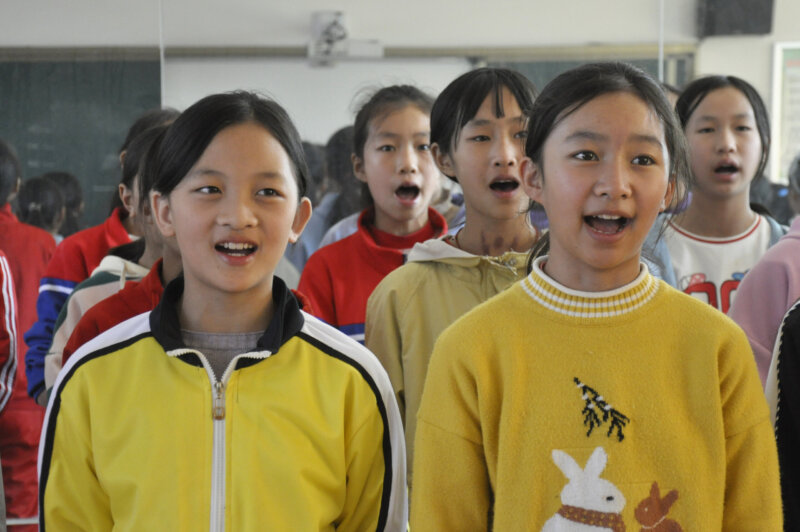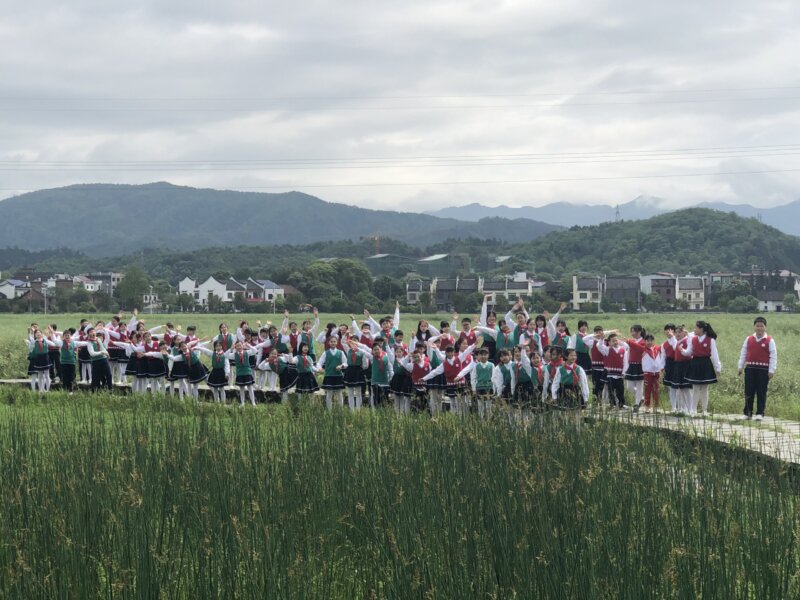Founder and chairman of Chinese electronics company TCL, Li Dongsheng, and his wife, Wei Xue, established Huameng Fund and TCL Charity Foundation. They promote education, poverty alleviation, and are committed to integrating technology with philanthropy. In an interview with CAPS, they discussed their family’s philanthropic aspirations, giving strategies, development plans, and views on family philanthropy.
TCL 创始人、董事长李东生和妻子魏雪先后创立了华萌基金和 TCL公益基金会,关注教育与扶贫,并致力于将科技与公益慈善相结合。在一次与 CAPS 的访谈中,他们分享了家族慈善的初心、捐赠策略和未来发展方向,以及对家族参与公益慈善的看法。
CAPS: What was the motivation in setting up the Huameng Fund and TCL Charity Foundation? What do you think of their unique functions and positioning?
创建华萌基金和 TCL 基金会的初心是什么?你们如何看待它们的独特功能和定位?
Li: I was part of the first generation of university students after the National College Entrance Examination was restored. My education transformed my future and taught me the importance of education in impoverished regions. Increasing national caliber is strongly linked to mandatory education, so we are committed to supporting education in impoverished areas as best as we can. Our goal is to provide financial assistance to outstanding students in these areas so they can complete their studies and compete on the same level with their peers for college admission.
李东生:我是恢复高考后的第一届大学生,知识改变了我的命运,也令我深深体会到贫困地区教育事业的重要,它关系到义务教育的进一步发展和民族素质的提高。我们愿意在有能力的情况下,通过支持贫困地区的教育事业尽绵薄之力回馈社会。希望通过资助,这些贫困地区的优秀学子能够顺利完成学业,有机会和同龄人站在高考的同一起跑线上。
Wei: Several generations of our family have been businessmen and have a legacy of doing good. Influenced by this, I saved and donated to the country even as a student, aiming to make a small but meaningful contribution. Inspired by Li’s lifelong aspiration to “give back to the world,” we established the Huameng Fund in 2007 after we married, with a primary focusing on supporting high school students in poverty-stricken areas. In 2021, we established the Huameng Charity Foundation, operating projects with a more professional approach. In the future, our goal is not only to excel and expand our charitable initiatives, but also to ensure that the next generation inherit family philanthropy. This is not solely about passing down wealth but, more importantly, about passing down the philanthropic spirit.
魏雪:我们家族前面几代人经商,就有做慈善的传统,耳濡目染下我在上学时候,也是会省下自己的生活费捐给国家希望能尽自己的绵薄之力。东生青年时代就有“达则兼济天下”的志向,所以婚后我们在 2007 年就成立华萌基金后,开始聚焦教育领域的投入, 2021 年正式成立华萌慈善基金会,以更专业的运营模式开展“华萌”公益项目。未来我们除了要把慈善的事情不断做好做大,同时也要让我们的孩子,我们的下一代将这种家族慈善精神的基因传承下去,不单单只是财富的传承,慈善精神的传承更为重要。
Li: TCL, along with multiple other industries, thrived during the early 1990s in tandem with China’s reform and opening-up, and engaged in charitable activities. However, these initiatives were not managed systematically. In 2012, the TCL Charity Foundation was established by TCL Group, marking the beginning of the professional operation of philanthropic projects. The Foundation gained substantial hands-on experience in areas such as education, poverty alleviation, technology, culture and sports, disaster prevention and control, and volunteerism. The projects have been successful. 2022 marked the TCL Charity Foundation’s 10th anniversary. As TCL transforms from a manufacturing company into a high-tech enterprise, we hope to leverage technology to empower philanthropy.
李东生:而 TCL 作为伴随改革开放成长壮大的企业,早在 90 年代初期,TCL参与各种内容的公益事业,但总体并未成体系化运作。于是 2012 年,在 TCL 集团的推动下,TCL 公益基金会成立,开启公益专业化道路,在教育、扶贫济困、科技、文化体育、灾害防疫、志愿者活动等领域积累了丰富的实践经验,也产出了丰硕的项目成果。2022 年是 TCL 公益基金会成立十周年。TCL 公益基金会的发展离不开企业自身战略的发展,TCL 从制造企业转型为高科技企业,我们希望借助企业科技优势为公益慈善赋能,探索科技与公益融合共生。
Founded by corporate donations, the TCL Charity Foundation has strong financial and corporate resources, as well as greater social responsibility. The practice of corporate social responsibility has a positive effect on the sustainable development of the company, for example, it can develop doing good culture within the organization, encourage more employees to take part in the charity activities, and attract more talents to join TCL. When employees find fulfilment in their jobs and work in a supportive environment, they are better equipped to care for their families. They are also more inclined to contribute to society, making donations, assisting vulnerable populations, and serving their communities however they can.
TCL 公益基金会是由企业捐赠统筹建立的基金会,拥有企业强大的资源及资金支持,其承担的社会责任则更大。企业践行社会责任对企业可持续发展有正向的作用,其中很重要的一部分功能是能够营造企业向善的文化氛围,带动更多员工参与慈善公益事业,吸引更多人加入 TCL。员工有一份好的工作以及良好的工作环境,他们能够照顾好家庭,同时也愿意为社会做出更大的贡献,履行更多义务,比如捐赠、帮助弱势群体,做力所能及的事情助力解决社会所需。
CAPS: What are your donation strategies and focus areas?
你们的捐赠策略和重点关注的领域是什么?
Li: The development of family foundations and funds occurs in stages, addressing urgent needs at different stages of a society’s development. We have tried to identify and address any gaps in the overarching national policies that are not adequately addressed.
李东生:家族慈善基金和基金会的发展是有阶段性,在社会发展的不同阶段助力解决社会所急需的各类问题。我们需要做的更多的是弥补、寻找国家大的政策下没有顾及到的领域。
Initially our projects prioritized youth education, offering financial aid to students. To date, 1,286 students have earned “Huameng Scholarships” through individual effort and determination. More than 40% have been admitted to prestigious universities. This project has invested 80 million yuan (approximately US$11.1 million) in youth education. We encourage students to cultivate diverse skills and qualities. In recent years, our projects have expanded to higher and cultural education. We made donations to my alma mater, the South China University of Technology, funding the construction of teaching buildings and setting up funds for teaching excellence and budding scientific research talent, with total donations amassing 140 million yuan (approximately US$19.5 million).
成立之初,华萌基金专注于青少年教育,主要是以资金资助方式帮助他们解决学习、生活中遇到的实际问题,目前,已有 1286 名学生凭借自身的努力和坚持,获得了华萌奖学金。其中近 40% 的学生进入了北京大学、清华大学、中国人民大学、复旦大学等 985、211 类院校;华萌在教育领域投入的资金累计达 8000 万元。随着项目发展,我们启动素质发展类活动,如华萌夏令营、华萌星课堂等活动,鼓励学生提升综合素质发展。近些年,华萌的教育也向高等教育和文化教育延伸;先后向我的母校华南理工大学捐建教学楼,奖教学金、青年科技人才的科研基金等,累计捐赠金额达 1.4 亿元。
Wei: Since 2021, a dedicated professional team manages our projects, and we have recalibrated our strategic direction to emphasize cultural and artistic development. The Huameng Charity Foundation has cultural and artistic resources. It is led by famed violinist Siqing Lü, who serves as the foundation’s director. Through a long-term and steadfast partnership with the Central Conservatory of Music, the Foundation is dedicated to leveraging these valuable resources and expanding support for art and culture, maximizing the impact of donations. We hope that the next generation can participate in the promotion of cultural and artistic philanthropy, continuing the legacy of this charitable spirit.
魏雪:2021 年,华萌慈善基金会正式成立,华萌迎来新的发展阶段,由专业化团队进行项目管理,并重新调整战略方向,重点关注文化艺术类发展。华萌慈善基金会拥有丰富的文化艺术资源,著名小提琴演奏家吕思清是华萌慈善基金会理事,我们与中央音乐学院建立了长久稳定的公益合作关系,华萌希望将这些资源效益发挥最大化,同时加大在文化艺术领域的捐赠投入。我们也希望下一代可以参加到文化艺术的慈善推广领域中来,同时将这份慈善精神传承下去。
TCL Charity Foundation will continue to focus on four primary areas: technology, education, culture and sports, and targeted assistance. Leveraging TCL’s leading technological abilities, we explore the integration of technology and philanthropy. We foster high-quality educational resources to nurture young talents, while also promoting innovation in culture and sports and spreading philanthropic values. Through sustained and targeted assistance, we strive for social equity and harmonious development. Our ultimate goal is to build a comprehensive and interconnected philanthropic ecosystem within TCL.
TCL 公益基金会持续聚焦科技、教育、文化体育及定向帮扶四大领域,凭借 TCL 领先科技,探索科技与公益融合共生;深耕优质教育资源,为青年才俊成长铺路搭桥;弘扬文体创新精神,让公益的价值观广泛传播;持续定向帮扶,助力社会公平与和谐发展,致力于构建一套完整的、循环的 TCL 公益生态系统。
CAPS: Can you describe the day-to-day operation and management of your charitable projects?
请分别介绍华萌基金和 TCL 基金会的日常运作机制,例如主要管理方、参与方和决策等层面。
Wei: The Huameng Fund was a special fund under the China Youth Development Foundation. After making donations and collaborating with the China Youth Development Foundation, we jointly executed projects, and determined the recipients and directions of funding. Following the establishment of the Huameng Charity Foundation in 2021, similar to the TCL Charity Foundation, both foundations have developed corresponding operating management systems in compliance with regulations. This involves establishing a board of directors, which meets annually to review the past year’s activities and approve the current year’s work plan, as well as a secretariat to supervise project executions.
魏雪:华萌基金早期是在中国青少年发展基金会下设立的专项基金,拥有单独的基金使用管理制度,我们向青基会捐款,确定捐资群体及方向后,和青基会共同进行项目的执行。2021 年华萌慈善基金会成立之后,和 TCL 公益基金会一样,两个基金会都依照基金会管理条例相关规定制定相应的运营管理制度,包括设立理事会、监事、秘书处,每年都会召开理事会,对上一年年度工作进行总结,对本年度工作计划进行审定,而具体的项目开展执行则由秘书处进行运营管理。
CAPS: As parents, how do you feel about your children’s involvement in family philanthropy?
作为父母,你们对下一代参与家族慈善事业的看法是什么?
Li & Wei: It is our responsibility as parents to make sure that the next generation understands the efforts and accomplishments of the generation before them. We want them to be aware of the impact of our philanthropic work. Philanthropy runs deep in our family as a cherished tradition: our ancestors’ philanthropic endeavors have consistently inspired us, motivating us to gradually embrace and actively engage in philanthropy ourselves. Our aspiration is for the next generation to recognize and appreciate our philanthropic endeavors but also actively participate in ongoing projects. By doing so, they will continue the legacy of benevolence within our family and extend positive impact on the people around them.
李东生 & 魏雪:作为父母,我们需要让下一代了解、知道他们的家族、父母做过什么,正在做什么。慈善是我们家族的传统,我们的父母、祖辈们长期所做的慈善义举时刻影响着我们,我们才能切切实实将慈善一步步落到实处。因此我们也希望下一代能够认可我们的做法,以实际行动参与到正在做的项目中来,将家族的向善之心不断传递给身边的人。
We have encouraged our children to think independently, observe, and take on leadership roles in charitable projects. By consistently engaging in philanthropic activities, they will inherit our philanthropic philosophy. By cultivating a positive, healthy, and optimistic worldview and values, children can enhance their leadership abilities, inspire greater participation in philanthropy, and become exemplary individuals who care for themselves and society, and contribute to humanity’s wellbeing.
孩子们能够拥有独立思考、观察的能力,创造属于他们独立领导完成的公益慈善项目,持之以恒地参与公益慈善事业,将华萌理念基因传承下去。形成积极、健康、向上的人生观和价值观,提升领导力,带动更多人参与公益慈善事业,最终成为对自己负责任、对社会有爱心、对人类有贡献的优秀公民。
CAPS: What is the significance of philanthropy and charity to your family?
你们如何看待公益慈善对您家庭的意义?
Wei: My mother often taught me, “A family that accumulates goodness will always have blessings.” In this age of uncertainty, personal monetary wealth comes and goes, but the spirit of serving the people and the public will be perpetuated from one generation to the next. My maternal grandfather was the prototype of the TV drama “Da Zhai Men” – the 15th generation descendant of the “Bai Jingyu Pharmaceutical Company,” Bai Ruiqi. Through generations of diligence, our ancestors achieved prosperity for our family. As successful as they became, they continued to shoulder their responsibilities and provide relief for the poor. Being raised in such a benevolent family sowed the seed of charity in my heart from an early age.
魏雪:我的母亲时常教导我:“积善之家必有余庆。”在这个充满不确定性的时代,个人的财富有聚有散,但为民为公的精神将代代传承。我的外祖父是电视剧《大宅门》的原型——“白敬宇药行”的第十五代传人白瑞启,祖辈通过辛苦积累让家族富甲一方,在成功后,也从未忘记过挑起责任的重担。他们数十年开粥厂救济贫者,设慈幼院收养孤童,捐资办学校,为妇女办编席厂,并在饥荒年间救助穷苦百姓度过灾难。在这样怀抱向善之心的家庭氛围下,慈善的种子早早地种在了我的心中。
As a mother of two, I aspire to impart my mother’s educational philosophy to them. By actively participating in philanthropy, I seek to set a positive example and imbue the next generation with a deep sense of compassion and responsibility. We believe that for any family with a historical legacy, the secret code to sustainable prosperity lies in philanthropy and public welfare.
作为两个孩子的母亲,我也希望将妈妈的教育理念在两个孩子身上传承下去,通过慈善让上一辈树立乐善好施的楷模,让下一代富有同情心、责任感以及建立正确的价值观。我们相信,对于任何一个拥有历史传承的家族来说,能使基业长青的核心密码,必是慈善和公益。
CAPS: What advice do you have for other families who wish to be involved in philanthropy and charity?
对于其他希望继续深度参与开展公益慈善事业的家族,您有哪些建议?
Li & Wei: As corporate citizens, it is imperative to integrate businesses’ sustainable development with societal progress. Corporations must fulfill their social responsibilities and take care of people in the long run. Furthermore, they should move away from excessive energy use, pollution, and unreasonable business practices, and focus more on sustainable development and social responsibility.
李东生 & 魏雪:企业作为社会公民,要将企业的可持续发展与社会的发展相融合,要重视人类长久福祉,努力践行企业公民责任,同时要清楚现代企业发展趋势,摆脱高耗能、高污染、以不合理的经营方式和代价换取利益的生产方式,更关注自身可持续发展与社会责任。
Focus on family wealth inheritance and the philanthropic spirit gene. Inheriting family wealth plays an important role in fostering proper wealth values within the family, so you must establish robust financial mechanisms for wealth transfer and ensuring culture and philanthropy continuity. Provide education and influence for the second and third generations. Foster a more sophisticated understanding of philanthropy and charity, actively participate in philanthropic endeavors, and collaboratively cultivate a culture of benevolence in society.
关注家族财富的传承以及公益慈善精神基因的传承。家族财富传承的意义在于树立家族对于财富的正确价值观,要做好财富传承的合理财务机制,做好文化、慈善精神的传承以及对二代、三代相关的教育和影响。拥有更先进的慈善观、公益观,更积极地关注慈善、参与慈善事业,一起推动社会形成向善的文化。
We should adapt to the trends in social development and avoid going against them. We need to understand society’s needs and solve social issues. Creating commercial value for society as a business is different from solving social problems addressed by philanthropy. Social problems cannot be solved overnight; they require persistence and professional management. Philanthropy is like a long-distance race, and immediate returns are difficult. It cannot be sustained solely by enthusiasm, but requires sincerity, perseverance, and adherence to social development laws. Philanthropic development must be sustainable for the long term.
顺应社会发展趋势,不要逆流而行。要了解社会需求解决社会问题,企业为社会创造商业价值,与慈善事业所解决的社会问题是不一样的。社会问题不是一朝一夕就可以解决的,需要持之以恒并投入专业化运营。做公益像一场持久的长跑,很难在短期看到回报,仅靠热情是没法坚持的,它需要真心,更需要毅力,同时也需要遵循社会发展规律,谋求公益的可持续发展。



